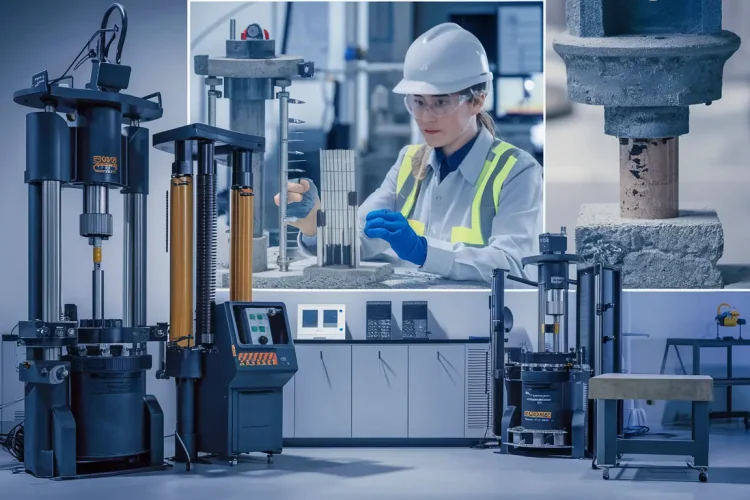
- By admin
- In Concrete Testing
Accredited Concrete Testing Lab NYC: Ensuring Quality and Reliability
The quality of concrete is crucial when it comes to building and developing infrastructure. Concrete must be precise and expertly constructed to ensure that it satisfies all standards and specifications. Accredited concrete testing labs are essential in this situation. As a symbol of excellence, accreditation reassures stakeholders and clients about the validity of testing protocols and outcomes.
Understanding the role of concrete testing
Concrete testing involves a series of evaluations to assess its properties and performance. From determining its strength to examining its durability, these tests provide vital insights into the quality of the concrete mixture.
Why concrete testing is essential
Before delving into the specifics of accreditation, it’s essential to grasp why concrete testing is indispensable in construction projects. Concrete serves as the foundation for structures, bearing immense loads and enduring various environmental conditions. Therefore, ensuring its integrity is paramount to the safety and longevity of buildings and infrastructure.
Types of tests conducted
Concrete testing encompasses a diverse range of assessments, including but not limited to compressive strength tests, slump tests, and durability evaluations. Each test serves a unique purpose in gauging different aspects of concrete quality and performance.
Importance of accreditation – AASHTO
Accreditation adds an extra layer of assurance to concrete testing procedures. It signifies that a testing lab meets specific standards of competency, impartiality, and reliability set forth by accreditation bodies. Boasting AASHTO accreditation, we are a Class 1 Concrete and Aggregate Testing entity.
Defining accreditation in concrete testing
Accreditation entails a rigorous evaluation of a testing lab’s competence, including its personnel, equipment, and procedures. It ensures that the lab adheres to recognized standards and practices in the industry.
Significance in quality assurance
For stakeholders involved in construction projects, partnering with an accredited concrete testing laboratory offers peace of mind. This indicates that testing procedures are carried out with precision and accuracy, minimizing the risk of errors or discrepancies in results. The importance of concrete testing services cannot be overstated, as they ensure the structural integrity and safety of the built environment.
What to look for in an accredited concrete testing lab
Not all accredited labs are created equal. When selecting a testing lab for concrete analysis, several factors warrant consideration to ensure the quality and reliability of results.
Key Factors to Consider
- Equipment and Facilities: State-of-the-art testing equipment and well-maintained facilities are essential for accurate testing.
- Expertise and Qualifications of Staff: Experienced technicians and engineers with relevant qualifications ensure proficiency in testing procedures.
Accreditation process and standards
The accreditation process involves several steps aimed at evaluating the competency and integrity of a testing lab.
Overview of the accreditation process
Accreditation typically involves a thorough assessment of the lab’s quality management system, technical competence, and adherence to specific standards.
Steps involved in getting accredited
From initial application to on-site assessments and proficiency testing, the accreditation process is comprehensive and rigorous.
International standards and certifications
Accredited labs often adhere to internationally recognized standards such as ISO/IEC 17025, ensuring consistency and comparability of results across borders.
Benefits of using accredited concrete testing labs
The benefits of partnering with accredited testing labs extend beyond mere compliance with regulations.
Advantages for contractors and builders
- Ensuring compliance with regulations: Accredited labs help contractors and builders meet regulatory requirements and industry standards.
- Enhancing credibility and trust: By demonstrating commitment to quality assurance, contractors can enhance their reputation and credibility among clients and stakeholders.
Common tests conducted in accredited labs
Accredited concrete testing labs conduct a variety of tests to assess different aspects of concrete quality and performance.
Exploring testing procedures
- Compressive strength test: Measures the ability of concrete to withstand axial loads.
- Durability tests: Assess the resistance of concrete to various environmental factors such as moisture, chemicals, and temperature.
- Chemical analysis: Identifies the composition of concrete mixtures and detects any impurities or contaminants.
Case studies: Real-world applications
Real-world examples demonstrate the tangible benefits of working with accredited concrete testing labs.
Examples of successful implementations
- Project A: Improved structural integrity: By conducting thorough testing and analysis, a construction project achieved enhanced structural integrity, ensuring long-term durability and safety.
- Project B: Cost savings and efficiency: Accurate testing results enabled a project to optimize concrete mix designs, leading to cost savings and increased efficiency in construction operations.
Future trends in concrete testing
As technology evolves, so do the methodologies and tools used in concrete testing.
Innovations and emerging technologies
- Advances in non-destructive testing: Techniques such as ground-penetrating radar and ultrasonic testing offer non-invasive ways to assess concrete quality.
- Sustainable practices in concrete testing: The industry is witnessing a shift towards eco-friendly testing methods and materials, aligning with sustainability goals.
FAQs
Why is accreditation important in concrete testing?
Accreditation ensures that testing labs meet specific standards of competence and reliability, providing confidence in the accuracy of test results.
How can I verify the accreditation status of a testing lab?
Accreditation bodies typically maintain directories or databases of accredited labs, which can be accessed online for verification purposes. Additionally, accredited labs usually display their accreditation certificates and logos prominently on their websites and official documents.
What are the consequences of using a non-accredited testing lab?
Using a non-accredited lab may result in unreliable test results, which can lead to faulty construction practices, safety hazards, and potential legal issues.
How often should concrete testing be conducted on a construction site?
The frequency of concrete testing depends on various factors, such as the project’s size, complexity, and regulatory requirements. Typically, testing is performed at different stages of construction, including during the mixing, pouring, and curing phases.
What are some red flags to watch out for when selecting a concrete testing lab?
Signs of concern include a lack of accreditation, outdated equipment, insufficient expertise among staff, and a history of inaccurate or inconsistent results.
Conclusion
In conclusion, accredited concrete testing labs play a vital role in ensuring the quality, safety, and reliability of construction projects. By adhering to stringent standards and procedures, these labs contribute to the overall integrity and longevity of infrastructure. For contractors, builders, and project stakeholders, connect with accredited labs is not just a regulatory requirement but a strategic investment in quality assurance.






